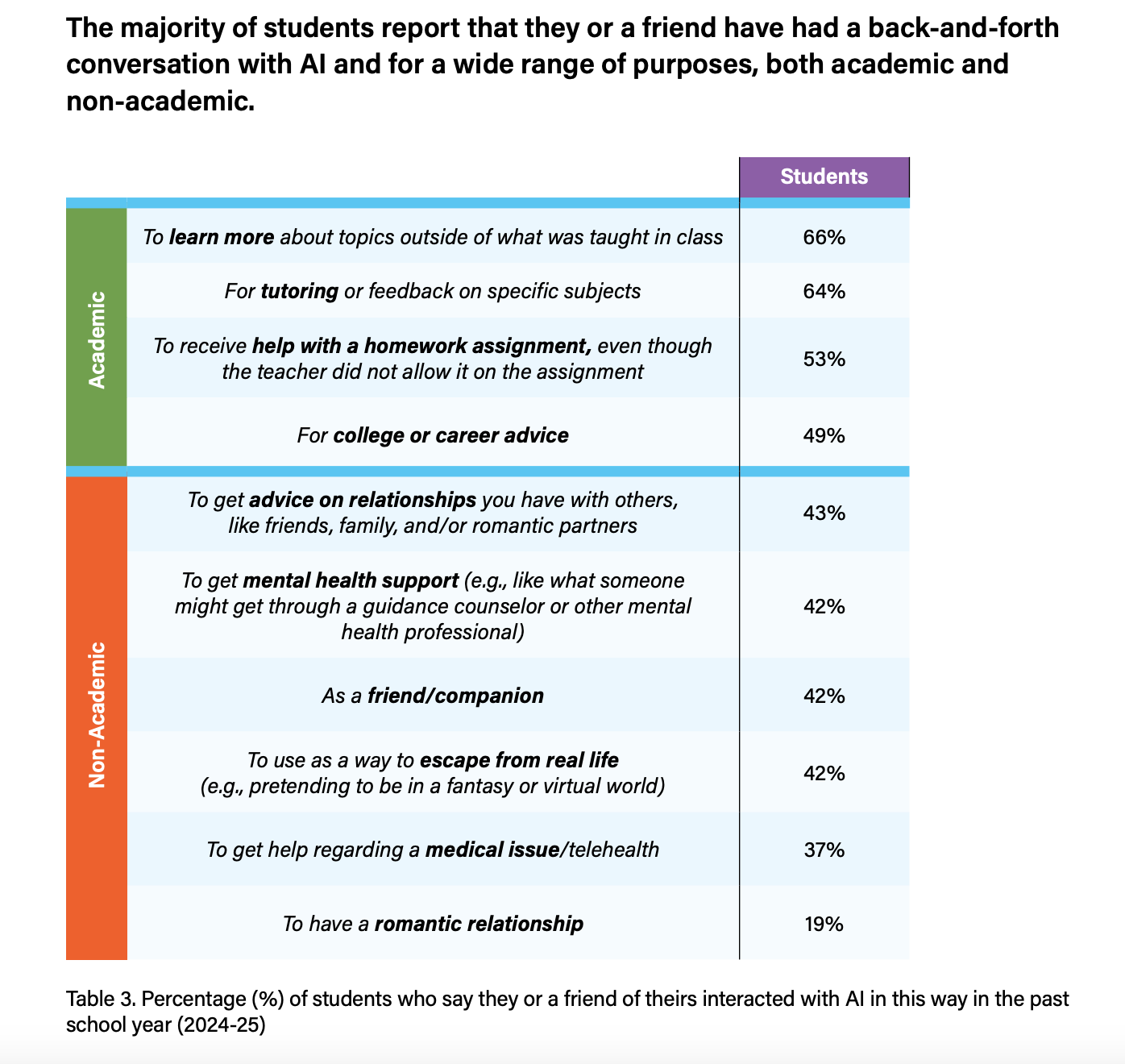Nearly half of high schoolers have had a relationship with AI or know someone who has
Plus: ‘Appstinence,’ Hot Girls for Cuomo, and the one place social media use is rising
Teens today are building relationships of all kinds with artificial intelligence. Let’s unpack that…
According to new data from the Center for Democracy and Technology (CDT), a nonpartisan and nonprofit organization focused on digital civil rights and civil liberties, high schoolers are turning to AI for emotional support, connection, and relationship advice at striking rates. Nearly half (43%) of high school students say they or someone they know has asked AI for relationship advice. And 1 in 5 have been romantically involved with AI or know someone who has.
Whether they’re confiding in ChatGPT about a fight with a friend or developing romantic feelings for a chatbot, the line between digital and human intimacy is officially blurred — and likely will be forever.
By the numbers:
42% of high school students have sought out mental health support from AI or know someone who has
42% have used AI as a friend or know someone who has
42% use it as an escape from real life or know someone who has
37% have used it for medical advice or know someone who has
19% have had a romantic relationship with AI or know someone who has
The Up and Up’s Take
This generation is redefining what connection means. When nearly half of teens see AI as someone they can confide in, it says something about trust, loneliness, and the aftershocks of growing up in isolation. It also says a whole lot about Gen Z’s relationship to technology — and how those intersect.
Today’s high schoolers grew up during Covid — years spent physically cut off from their peers, emotionally confined to family circles, and forced to make connections through screens. That formative experience shaped how they relate to technology now. AI is familiar; it’s always available, judgment-free, and safely distanced from the risks of real-world rejection. For some, AI offers the kind of patient, nonjudgmental listening adults promise but rarely deliver. It’s there for them when they don’t feel comfortable talking to their parents or friends — and is a loyal confidant when they don’t have others to turn to. For others, it’s a space to experiment with vulnerability without consequence (and, IMO without real reward). Either way, Gen Z’s relationships with AI are an extension of the coping mechanisms they learned in isolation and a signal that the emotional framework of adolescence is being written in real time.
This generation has grown up emotionally fluent in algorithms and is changing what it means to be in a relationship, on and offline. Because they have lived behind screens their entire lives, they view relationships as connections that can be curated, shaped, personalized, and even turned off. That shift could change everything from how they build friendships to how they approach intimacy, empathy, and trust itself.
One layer deeper: There’s a high stakes catch. Most of today’s AI is overly agreeable. Sam Altman has even admitted as much, saying he would fix ChatGPT’s “yes-man” default. There is certainly an upside to the fact that lonely teens can turn to AI for advice. But there’s a dangerous downside that could result from that relationship when the “friend” in question is willing to confirm and reinforce everything the human operator thinks.
Other news
Gen Zers are leading the “appstinence” movement
Subway Takes is rising in the podcast ranks
New Balance is eyeing Gen Z athletes
Social media use is dropping everywhere except here
The launch of ‘Hot Girls for Cuomo’... ‘Hot Girls for Zohran’ is already a thing
Noteworthy reads
In small towns and rural communities, young voters say they feel unseen by leaders, Elena Moore for NPR
When Children of Public Figures Go Public With Their Dissent, Callie Holtermann for The New York Times
Trad Wives, Move Over. Trad Sons Are the New Homesteading Influencers., Olivia Empson for Vanity Fair


